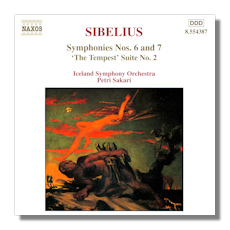
The Internet's Premier Classical Music Source
Related Links
- Sibelius Reviews
- Latest Reviews
- More Reviews
-
By Composer
-
Collections
DVD & Blu-ray
Books
Concert Reviews
Articles/Interviews
Software
Audio
Search Amazon
Recommended Links
Site News
 CD Review
CD Review
Jean Sibelius

Symphonies #6 & 7
- Symphony #6
- Symphony #7
- Suite #2 from The Tempest, Op. 109, #3
Iceland Symphony Orchestra/Petri Sakari
Naxos 8.554387 71:17
This is the final installment in Sakari's Sibelius symphony cycle, and it may be his most convincing work yet. His scaled-down accounts of the First and Third, paired in Volume 1, were also quite compelling, though his Second (Volume 2) was somewhat eccentric in its un-heroic demeanor. In the end, though, his reading there worked because of his consistency of approach and ability to phrase with feeling and intelligence. It's hard to forget the 40-year-old Monteux recording of this symphony, a performance no one has outdone. The third release in this Naxos series featured the Fourth and Fifth Symphonies. The former was appropriately grim and lean, but with an overly quick tempo in the finale. The Fifth may have been the most successful single performance in the set.
The Sixth here rivals it, however. The first movement comes across with just the right amount gentleness and sweetness at the outset, the nearly perfect mixture of joy and energy in the middle sections, and the necessary reflective qualities at the close. The succeeding movements are also rendered in the right spirit.
After the Bernstein Seventh on DG (paired with a fine Fifth), this Sakari reading would be my preference. In fact, if it were not for one minor blight, this might well be the recording of choice, owing to Bernstein's somewhat stretched out tempos throughout. Sakari starts off with appropriately sinister atmosphere and the music proceeds to slowly build up with great care to detail. Then the conductor accelerates for a few bars at 4:38, and while this may be arguably defensible, it never sounds correct. Bernstein keeps virtually the same tempo, and to greater effect. In any event, this is my only complaint here, as the rest of the performance is splendid.
Overall, Sakari's cycle must be ranked with the better ones, both the Colin Davis efforts (Philips and RCA), Ashkenazy (London), and Maazel (Sony). What it comes down to in the case of this Naxos cycle is whether a more scaled-down approach is to your taste. The Iceland Symphony is a 72-piece ensemble and Sakari never tries to overplay his hand, thus taking a lean-sounding and almost neo-Classical approach to these symphonies. The orchestra plays splendidly and the sound provided by Naxos is fine throughout the series. Plus there are well-played fillers included, here the Suite #2 from the Tempest. In the end, this is one of the better entries in the series, and the whole series itself can be recommended as a marvelous bargain.
Copyright © 2001, Robert Cummings


















